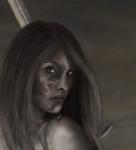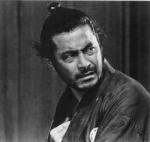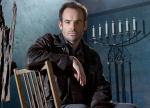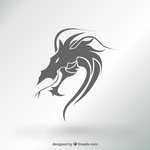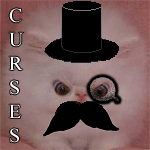This was I think the most frustrating novel set in the Malazan universe that I have read, and the first one that I genuinely think I may not re-read.
Having said that, I still hold a lot of hope for both the Jacuruky and Assail novels. Why? Because I think the thing that ICE struggles the most with is fitting a story into an already-created world. The constraint seems to get to him. SW showed that he can be very competent at world-building, and I believe the not-previously explored settings of Jacuruku and Assail will allow ICE the freedom he needs.
Anyway, on to the brighter points of OST, because there were some here and there.
- Benden/Butcher:
My god Suth in SW was boring. While not quite as good as Nait/Jumpy in my estimation, ICE's new take on the soldier in the ranks is something we haven't seen before in the Malazan books. A guy with a lot of unlikeable qualities which are nevertheless well-explained by his upbringing. I enjoyed the comparisons and the subtle differences that Benden discovered between his previous life and his army life.
- Aragan:
Who didn't want to see Aragan step up to a central role in the Malazan books
- The bone phone:
I liked how ICE redeemed a GotMism. Turning the bone phone into a Sceptre designed for direct communication with imperial HQ, and a closely-guarded secret (hence not many people ever mentioning it), was a nice twist. And it fits into the title of the book
- Dev'ad Anan Tol/The Miner Imass:
May have spelled his name wrong there
- The beginning:
When I read the prologue and chapters which became available before release, I got quite excited. It was a great start and a great build up. The parts on the Seguleh Isle were very interesting and gave some good insight into Seguleh culture. Even for a while after these parts, I was enjoying the book. Ebbin's time in the tomb and the Tyrant's first appearance were suitably chilling, I thought. Plus there were hints that we would learn more of the Moranth, that other most mysterious race, as well as the Seguleh. A pity that did not transpire.
- Topper:
I thought that this was the one pre-existing character that ICE nailed. All the more surprising seeing as the Topper of RotCG was unrecognisable. But the haughtiness, arrogance, and the aura of menace was spot on.
- The truth of the T'orrud Cabal:
A twist that I didn't see coming, but one that actually made a lot of sense. All of the T'orrud, not just Vorcan, were demons who had previously been enslaved to the Tyrant. I have to say, I really really liked this twist. Now if only the rest of the Tyrant storyline had been as good...
Now for the bad, a lot of which are related to each other:
- The build-up:
The middle part of the book just dragged and dragged for me. Constant switching from one POV to another but seemingly very little happening in any of them. The pieces seemed so slow to fall into place, with little to no explanation or hints to the reader why exactly any of these things were happening.
- The ending:
This book and SW suggest that ICE has a real problem knowing where his novel is actually going. Both ended ubruptly, surprisingly (not in a good way) and before the action had even seemed to really get going. Honestly, when all the characters started saying goodbye to each other and we were getting wrap-up scenes for everyone, I was thinking, "So wait, the Tyrant's dead then?!".
- Kruppe:
I don't know why this hasn't been mentioned more. I know in the grand scale of things, this seems minor, but actually, is it? This is, after all, a major, and very distinctive, character whom we have all known for a long time and a lot of people love. What am I referring to specifically? The use of first-person when Kruppe was speaking, which happened roughly two-thirds of the time. This may seem minor, but it's such an essential feature of Kruppe's character that he speaks in third-person that it completely jarred me from the novel each and every time! And the ways in which it happened! In the same sentence, ICE would constantly switch between first- and third-person! At least be consistent! I don't know whether to blame ICE or his editor for this, but it seems like such an easy thing to get right. Honestly, how hard is it to remember that this one character refers to themselves in the third-person? It was very disappointing, especially after I had heard so many early readers say that ICE's Kruppe was good. I would have to disagree.
- The Spawn:
The main issue that I had with the Spawn plotline is what Antsy was doing there in the first place. It didn't seem particularly believable to me that Antsy would just leave the others in Darujhistan when they had unfinished business with Humble Measure. Yes, Blend had taken care of the Assassin's Guild, but she had also extracted the name of Humble Measure from Seba Krafar as the contractor, so why did they not go after him? I mean, aside from the fact that ICE didn't want to write about it?
There were other issues with this plotline, however, such as the vast wealth of precious gems and other treasures which the Andii seem to have decorated the Spawn with. This just runs contradictory to everything we've heard of the Andii under Rake, who couldn't care less about such things. I'm not saying they wouldn't have ever collected anything, but when rooms decorated with gleaming gems and jewels were described all I could think of was, 'Really? Andii? Really?'. There were some other, more personal and minor, frustrations with this plotline - such as Malakai transforming from assassin to super-thief when the plot called for it, and ICE's proclivity for having Draconus turn up at random moments in shade form. Oh yes, and why exactly was the First's mask in Moon's Spawn?
- The Seguleh:
Sigh. So much potential. Such a hopeful start too. But then it was as if ICE had thought, "right, got that over with, I think that's depth to the Seguleh culture pretty much covered!" Ok, I did like the fact that we got POVs from the Seguleh, and I did like how their belief system was turned on its head - an exodus turned into exile - over time. And we even perhaps got a bit more depth given to them than I initially gave credit, through Lo and his son (though any problems they had appear to have been swept under the carpet at the end). Jan, too, was not a bad character, and actually had some of the best internal monologues in the book. The problem lies not in their "screentime", however, but in what they did with it, which turned out to be very little. Yes, they were in a lot of fight scenes, but we've seen Seguleh fight before - this was a book which could have shown that they were not just one-dimensional fighting machines.
Concerning the Seguleh, the thing that frustrated me the most, by far, was the fact that Senu and Mok were missing from the book. Yes, I understand that ICE wanted to do it with his own characters like Jan, but it's pretty appalling to thrust aside someone like Mok, who, as Third, is a major part of the Seguleh world with the dismissive lines "had returned broken." Why? How? When? When this line was read, it conjured up all sorts of intriguing notions about what could have happened to Mok, when he was going to enter the scene, what he would do, etc....but to then turn out that ICE had simply written that in order to not have to bother putting Mok into the story was pretty unbelievable.
- Tayschrenn:
I actually had no problems with the Kiska/Tay storyline (except for the irritating way Leoman's moustache was described *every single time* Leoman was mentioned) until near the end, after Tayschrenn gets his memories back. He then has an existential crisis, WHICH LASTS ALL OF FIVE LINES. "Why not be both?" "Yeah, ok! Or, erm, hmmm, got to try and sound deep here....perhaps neither too!" I will reserve judgement on the T'renn absorption with K'rul thing because it will probably come up in another book, but even that leads to that other problem - too much seemingly unnecessary ambiguity.
- The Moranth:
I didn't understand this. ICE clearly loves the Moranth. He's managed to crowbar them into plots in both RotCG and SW after all. And again, early hints that we would learn more of them. Not to be, again. Why is it that the Moranth always seem to be the ones who remember everything accurately, whether it be about the Barghast, Edur, or Seguleh, and no one else can? I'm not saying that can't be the case, but doesn't that sound like an interesting concept to follow through on? Of course, this is not even to mention the guild/caste system which wasn't expanded on at all despite the Moranth's central role in proceedings.
And for all those saying that at least we learned why the Moranth have their munitions and armour - to help combat the Seguleh - while I agree, isn't that just inference? I don't remember that actually being mentioned in the book.
- The Rhivi:
So they're a horse culture are they now? Funny how we haven't heard anything about that before.
- The Malazans:
Many interesting characters pushed to one side and left helpless and useless, I think that was what was galling here. Especially when it didn't have to be. Fist Steppen, for example, came across as someone to whom there was much more to learn about - the last commander of the last remnants of the army that was at Black Coral, and what was it with her propensity to build forts? - but then we have one brief POV with her which reveals nothing before she dies. The ten-thousand strong Malazan army which appeared to have no clue how to fight against (ok, the very best) four hundred warriors. K'ess and co didn't come across as people who underestimated the Seguleh, and yet they appeared to have no tactics whatsoever either.
And that crying scene was cringing, inappropriate, unbelievable, stupid, and nonsensical.
And then the Bridgeburners. Talk about being sidelined. ICE had no idea what to do with them, and anything that they did end up doing turned out useless and unnecessary anyway. And why exactly was K'rul's bar/temple being attacked? Never explained. Yes, I get they wanted to get to K'rul, but why? And why, before them, did Humble Measure wish to do the same?
- The Tyrant:
So....he's a mask? Because, from the levels of explanations within the book, that's about as much factual truth as is available. The main problem here is one of motivation. Why is he so hell bent on ruling Genabackis? Just because? Why does he keep coming back? What was he in the past? And then - why did those arrows kill him? Yes, I know they were made from bits of Dragnipur, but so what? What effect did that have exactly? Not explained. There was one great scene with the Tyrant, and that was when he was revisiting a past memory with Ebbin, and he was talking about escaping fate and not having things turn out exactly the same. Why weren't there more of these scenes - this seems a perfect way to get across his past, his motivation, his plans, etc. In the end, for all we know, he did everything exactly the same and so things turned out exactly the same. We don't know what, if anything, he attempted different.
There's more things really, but I'll just go on to this:
- THE MAIN ONE: Ambiguity:
Here is the main difference between SE and ICE: SE HAS AMBIGUOUS AND MYSTERIOUS CHARACTERS, ICE HAS AMBIGUOUS PLOTS. That's why ICE can't seem to pull off ambiguity to the same mostly-satisfying extent that SE can. Far, far far too much reliance on (literally) "then something happened", "him", "it", and "....." when characters are suddenly interrupted for no good reason. This style was personified by the witch who said almost nothing but "almost time...." for the entire book. Constantly I was asking what actually just happened, hoping it would be explained later, only to find that nothing ever was. Too many key plot points with ALL the major characters happened off-screen.
Do you know what it felt like actually? Like ICE was contractually obliged to write this one, and tried to get it over with as quickly as possible. I'm not saying that's what it felt like the whole time, but certainly there were moments...
QUESTIONS:
- How come the Moranth were fighting the Seguleh before the shield wall even came down? Can people simply pass through it when munitions can't?
- Was the Tyrant finished off by the arrows, or by Kruppe dancing around him, and why?
- Was it the Tyrant's mask that Humble Measure and Barathol took at the end?
- What was Vorcan referring to when she said, 'Well, I had to try' to Rallick at the end?

 Help
Help



